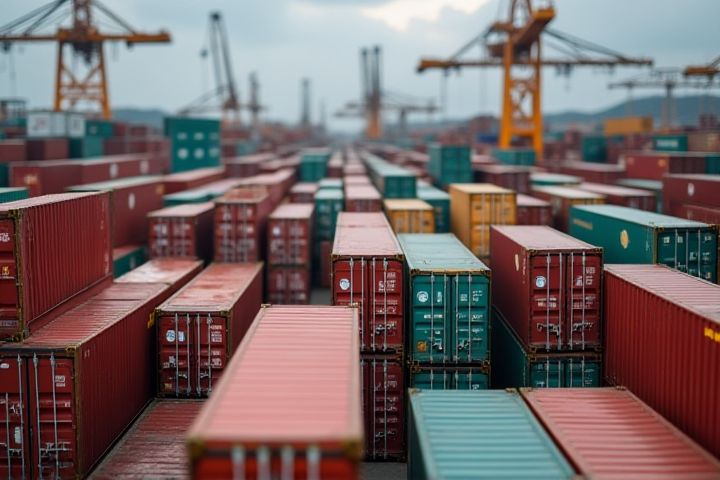
Nigeria's export sector significantly contributes to its economy, with crude oil being the primary export, accounting for a major portion of government revenue and foreign exchange earnings. Agricultural products like cocoa, rubber, and cashew nuts are also vital, providing opportunities for diversification and rural development. The country plays a critical role in the Economic Community of West African States (ECOWAS), facilitating regional trade through various import agreements. By tapping into growing markets for textiles and solid minerals, you can enhance your business scope. Import policies in Nigeria are influenced by tariffs and regulations aimed at promoting local industries while ensuring essential goods remain accessible.
Export licenses
Export licenses in Nigeria are essential legal documents required for businesses intending to trade goods outside the country. The Nigerian Export Promotion Council (NEPC) oversees the licensing process, ensuring compliance with national regulations and international trade standards. Obtaining an export license not only legitimizes your business operations but also facilitates access to various trade incentives, such as duty exemptions and export credit guarantees. To secure your export license, you must provide necessary documentation, including a business registration certificate and a detailed description of the goods intended for export.
Import duties
Import duties in Nigeria significantly impact the overall cost of goods entering the country, influencing trade dynamics and pricing strategies. The Nigerian Customs Service is responsible for collecting these duties, which vary based on the classification of goods, with essential items often enjoying lower rates. It's crucial for businesses and individuals engaged in import activities to understand the specific tariff codes associated with their products to ensure compliance and optimize costs. Additionally, your awareness of the changing regulations and potential exemptions can lead to substantial savings in the importation process.
Foreign exchange regulations
In Nigeria, export and import activities are significantly influenced by foreign exchange regulations established by the Central Bank of Nigeria (CBN). These regulations govern the allocation of foreign currency, affecting how businesses transact internationally. Companies must comply with documentation requirements and exchange rate policies to facilitate smooth cross-border trade. Understanding these foreign exchange policies is crucial for businesses seeking to optimize their international operations and maintain compliance with Nigerian trade laws.
Trade agreements
Trade agreements in Nigeria significantly influence export and import activities, fostering economic growth and international relationships. The African Continental Free Trade Area (AfCFTA) enhances Nigeria's position in regional trade by reducing tariffs and improving market access for goods and services. Bilateral agreements with countries like China and the United States further stimulate trade, providing Nigerian exporters with opportunities to access broader markets. Understanding these agreements can help you navigate the complexities of international trade and maximize your business potential in Nigeria.
Documentation requirements
Export and import operations in Nigeria necessitate a comprehensive understanding of documentation requirements to ensure compliance with local regulations. Key documents include the Bill of Lading, Export Declaration Form, and Certificate of Origin, vital for verifying the legality and origin of goods. Importers need to secure an Import Permit and a Tax Identification Number (TIN) to facilitate customs clearance and taxation processes. Familiarizing yourself with these documents streamlines the trading process and minimizes delays at Nigerian ports.
Tariff classifications
In Nigeria, tariff classifications play a crucial role in the export and import processes, determining the duties and taxes applicable to various goods. The Nigeria Customs Service (NCS) utilizes the Harmonized Commodity Description and Coding System (HS Code) for effectively categorizing products, enabling easier identification, and ensuring compliance with international trade standards. Importers and exporters are mandated to accurately classify their goods to avoid delays, penalties, or legal issues during customs clearance. Understanding the intricacies of these tariff classifications can significantly enhance your trade efficiency and increase profitability in the Nigerian market.
Customs procedures
Customs procedures in Nigeria are essential for regulating the import and export of goods, ensuring compliance with local and international trade laws. The Nigeria Customs Service (NCS) oversees these procedures, including documentation, clearance, and tariff assessments, which are crucial for efficient trade operations. You must provide accurate declarations and pay appropriate duties to facilitate seamless transactions across borders. Understanding the specific requirements for various goods can help avoid delays and penalties during the customs process, enhancing your business efficiency.
Port infrastructure
Nigeria's export and import activities are heavily influenced by its port infrastructure, notably the Lagos Ports, which handle a significant portion of the nation's cargo. The Apapa and Tin Can Island ports serve as critical gateways for trade, facilitating the movement of goods such as oil, agricultural products, and manufactured items. Upgrading and expanding these facilities can significantly enhance efficiency, reduce congestion, and improve overall supply chain logistics. Investing in modern technologies and maintenance for port infrastructure is essential to bolster Nigeria's competitiveness in global trade.
Product standards
Product standards in Nigeria play a crucial role in regulating export and import activities, ensuring goods meet safety and quality benchmarks. The Standards Organization of Nigeria (SON) is responsible for developing these standards, which align with international best practices to enhance market access for Nigerian products. Compliance with these standards not only boosts consumer confidence but also facilitates trade by minimizing barriers and ensuring fair competition. For you, understanding these regulations can significantly impact your business operations and international trade success.
Trade incentives
Nigeria's export and import activities significantly benefit from various trade incentives aimed at boosting economic growth. Key initiatives include tax exemptions, reduced tariffs on essential goods, and access to export financing, all designed to encourage local industries while attracting foreign investments. The government has established export processing zones, providing businesses with streamlined customs procedures and the opportunity to operate in a tax-friendly environment. For your business, understanding these incentives can enhance operational efficiency and improve profitability in the competitive Nigerian market.
